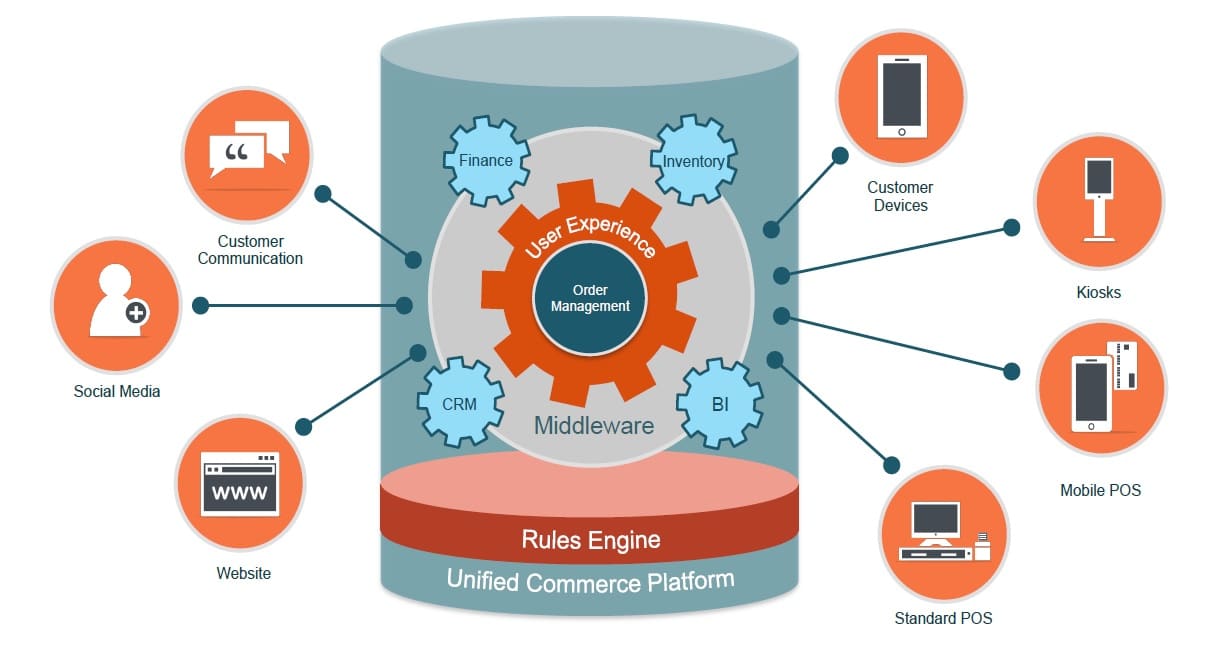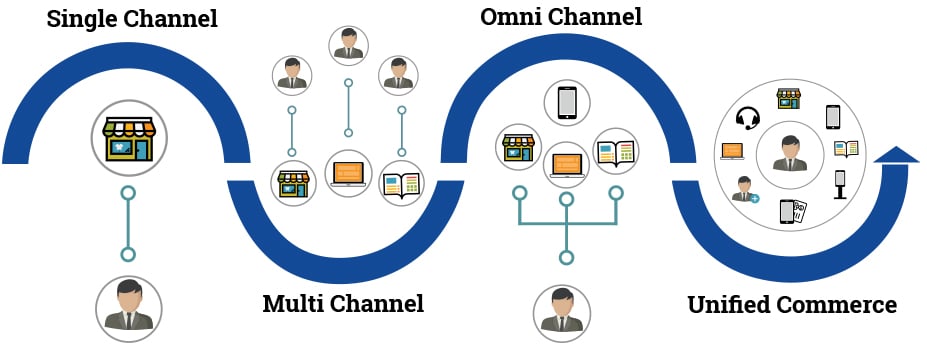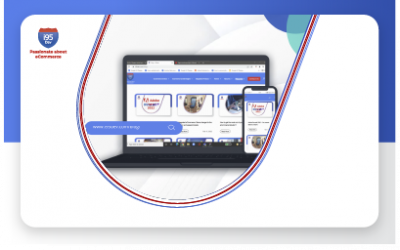It is no longer just about the product, brand, or channel; the shopping experience also plays a very important role in deciding where customers buy and in driving customer loyalty. And to deliver that unforgettable shopping experience, with increasing competition, the conventional marketing and sales strategies (read merchandise, pricing, discounts or other value-adds) are no longer sufficient. Businesses need to innovate and find other ways to drive that experience.
It does not end with that. Businesses must also ensure that the experience is also consistent across all channels of sale. This gave birth to the concept of omni-channel retail – provide a consistent and seamless shopping experience across channels. But driving omni-channel experience can be challenging with disconnected systems. Enters Unified Commerce.
Unified commerce helps you deliver the omni-channel experience by replacing disconnected channels/ systems with a single commerce platform. A single and centralized platform for all customer engagement points (web, mobile, POS, call center, etc.) is the driving principle behind unified commerce.
Image source- Boston Retail Partners
The Emergence of Unified Commerce
Traditionally, businesses have had a presence across multiple channels with each channel gathering a lot of data. The data silos thus generated not only had a lot of redundant data but also were limited in their use because of the disconnect between them. As a result, executives took decisions based on incomplete and inconsistent data, which further limited their ability to improve the customer experience.
For example, if you are a retailer with an e-commerce store and a chain of physical stores. You will have an e-commerce platform to manage the e-commerce store and POS application to manage your physical stores. With disconnected systems, your store representatives will have no idea about the customer interactions (purchase history, abandoned carts, wish list, etc.) on the e-commerce store. Without that information, your store representatives will never be as effective as they could be if they had that information.
- A customer with a certain product in his/her wish list visits your physical store. With access to this information (provided the customer identifies himself/herself), your store representative could have made an effective sales pitch to the customer. Which could never have been possible without access to the right information.
The same is true in the reverse scenario. Imagine the effectiveness of your cross-sell/ up-sell algorithms and your marketing promotions if the information from POS system was made available to your e-commerce system.
Now this can be achieved in two ways
- Integrating your disconnected systems, and
- Working with a Unified commerce platform.
There are pros and cons of each approach (we will save that for another blog). Broadly, in the first approach you work with your existing systems and ensure that the data is shared across by integrating them. In the second approach, you replace all your existing systems with a single unified commerce system.
Image source- Boston Retail Partners
Benefits of Unified Commerce Platform
Improved customer experience and simplified technology are not the only benefits of unified commerce platform. A single commerce platform can drive multiple benefits like
Sales & Marketing
- Increase Sales & Acquire New Customers
- Unified commerce can help you increase sales and acquire new customers by making it possible to provide options like buy online pick up in store, buy online return in store, buy in store deliver it home, etc. possible. It also helps you drive sales by leveraging the centralized data and driving improved marketing and promotional campaigns.
- Build Trust and Confidence
- Most business transactions are driven by trust. Your customers extend a leap of faith in your brand when they purchase a product. Unified commerce platform can help build trust and confidence with your customers by giving you an ecosystem where you run your business effectively while keeping things transparent for your customers. Even simple things like keeping your customers informed about the status of their order and letting them track its progress can go a long with in establishing that trust relationship with your customers.
- Improved Forecasting and Demand Planning
- One of the greatest challenges decision-makers traditionally face in a disconnected environment is the availability of accurate and actionable information. Because of which, critical business decisions are at times made based on ‘gut feelings’. Unified commerce platform gives you access to reliable and accurate data, which can then be used for improved forecasting and demand planning.
IT & Operations
- Reduced Errors and Improved Operational Efficiency
- To drive omni-channel experience in a disconnected environment requires a lot of back and forth between systems. This is both an error prone and inefficient process. A Unified commerce platform, by eliminating the need for multiple systems, helps you reduce errors, costs, and improve operational efficiency.
- Improved Inventory Management
- Inventory management is a crucial aspect of any business, and it becomes even more critical when businesses sell across multiple channels. Unified commerce platform ensures cross-channel visibility and prevents businesses from both overselling and underselling of inventory.
- Streamlined and Automated Business Processes
- With unified commerce platform, you are no longer limited by the scalability of multiple systems. A single centralized platform helps you grow faster by streamlining and automating your critical business processes like order fulfillment. This also improves your employee productivity by eliminating manual process and helps them focus on things more important.
Customer Experience
- Enchant Customers with Informed Sales
- By giving sales representative access to all customer interactions across channels, unified commerce platform enables them to make informed sales decisions. For example, they can use order history to cross-sell and up-sell products better, use payments and invoice history to negotiate better payment terms, and more. Further, the entire shopping experience can be personalized to every customer.
- Efficient and Streamlined Returns Management
- Returns, which plays a very important role in a customer’s purchase decision, is usually a long and complex process involving multiple teams and systems. Unified commerce platform can streamline this complex process by making information available and eliminating the need for unnecessary communication. This is can dramatically improve conversions and also improve customer loyalty.
- Deliver the Omni-channel Experience
- Unified commerce platform helps you deliver omni-channel experience to your customers by ensuring consistent and uniform information across channels. This opens up a world of opportunity for both brand and customers – options like, buy online pick up in store and others become a possibility, which earlier could not be entertained.
Recent Blogs
Managing Massive Product Catalogs: Why Synchronization is the Key to Efficiency
Managing Massive Product Catalogs: Why Synchronization is the Key to Efficiency Author Category Share The automotive aftermarket industry is vast and highly competitive, requiring businesses...
A Complete Guide to Seamlessly Integrating Adobe Commerce with NetSuite
A Complete Guide to Seamlessly Integrating Adobe Commerce with NetSuite Author Category Share Integrating Adobe Commerce (formerly Magento) with NetSuite ERP can transform the way businesses...
Why Shopify and NetSuite Integration is Crucial for Your eCommerce Success
Why Shopify and NetSuite Integration is Crucial for Your eCommerce Success Author Category Share The digital transformation of commerce is accelerating. According to Gartner, by 2025, a...






